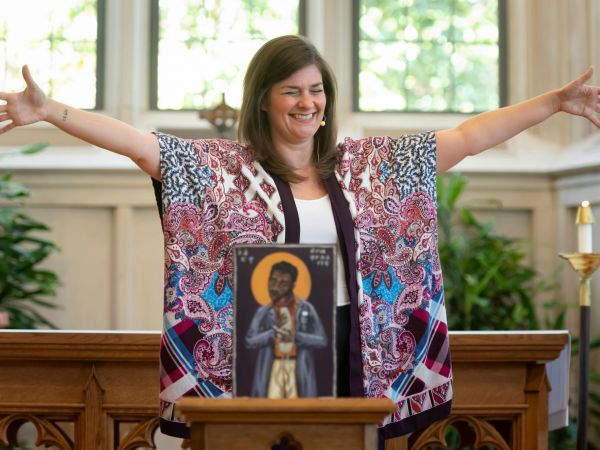The Certificate in Prison Studies can be earned within the residential M.Div., M.T.S, and Th.D programs and provides students with the opportunity to engage specifically with people in prison and the system that imprisons them in the context of theological education and formation for ministry.

I have seen without a doubt that God is present in the prison, certainly as much as if not more so than in the church. This may surprise some, but whenever people are hurting, isolated, confused, broken, abandoned, and in need, we would be naïve to think God is not present there. Scripture tells us that these are the places where God seems to do his best work: with the unexpected, the unlikely, the unchosen or marginalized.
Students in the certificate program take a course on restorative justice and an additional prison studies elective. They also participate in a Project TURN course taught on-site in a local prison and complete a field education placement in a prison setting, a local church doing prison ministry, or a non-profit organization that works with incarcerated persons. In addition, students join a designated prison-oriented spiritual formation group or they can petition to complete an approved research project.
Beyond the certificate program, the program in Prison Studies also brings speakers to the Divinity School to address issues related to justice and prison ministry within the larger community. Student groups focused on prison ministry and justice also host regular events, including panel discussions and screenings of documentaries on justice issues.

Project TURN
Project TURN classes at Duke Divinity School seek to enhance the theological education of both incarcerated people and full-time seminarians by creating an environment in which they can learn from and alongside one another. Students of each class include roughly 10 residents of the hosting prison and 10 seminary students enrolled at Duke Divinity School. Project TURN seeks to offer quality education in the fields of Christian theology, ethics, biblical studies, Christian history, pastoral care, and Christian discipleship to all interested students, regardless of life circumstance, by providing this education to incarcerated students free of charge with provisions for books and course materials. In addition to theological training, the program also offers incarcerated students an opportunity to enhance the written and oral communication skills necessary for a successful transition out of prison into the job market and future education. Finally, the program offers seminary professors an opportunity to teach and learn outside the traditional seminary setting, revitalizing professors’ commitment to their own vocation and expanding their research interests. Courses are currently being offered at North Carolina Correctional Institution for Women in Raleigh, N.C. and the Federal Correctional Institution II in Butner, N.C.
For incarcerated students, completion of eight TURN courses yields a “Certificate of Achievement in Theological Education” issued by Duke Divinity School.
For non-incarcerated students, participation in a TURN course is one of the requirements of the Certificate in Prison Studies.
Requirements
Find detailed information about requirements and courses for current students (NetID required) »
For more information contact the certificate co-directors:
Douglas Campbell
Professor of New Testament and Director of Prison Studies
dcampbell@div.duke.edu
(919) 660-3465
Sarah Jobe
Consulting Faculty at Duke Divinity School
sarah.jobe@duke.edu
- Completion of identified prison ministry course
- Participation in a Project TURN course taught on-site in a local prison. These classes are accredited by Duke Divinity School, primarily taught by Divinity School faculty, and can be found in the Divinity School course offerings.
- Completion of one further course addressing relevant questions of justice, atonement, race, gender, conflict, ministry, etc., and approved by the director (courses designated as "Prison Studies Electives").
- An appropriate directed study approved by the certificate director may be substituted for this requirement
- Completion of a suitable field education placement where you are placed either within a prison setting, a local church doing prison ministry, or a non-profit working with incarcerated persons.
- Participation in a designated prison-oriented spiritual formation group, or, on petition, completion of an approved research project.
- Completion of identified prison ministry course
- Participation in a Project TURN course taught on-site in a local prison
- Completion of one additional course approved by the director that addresses questions relevant to prison studies (for example, treating approaches to justice, atonement, race, gender, conflict, or contextual ministry). An appropriate directed study approved by the certificate director may be substituted for this requirement
- Completion of an MTS thesis that focuses on some aspect of prison studies that (1) takes the voices of incarcerated people (past or present) seriously and (2) views the prison as a site of significant learning and investigation.
- Completion of two courses related to carceral studies.
- Service as a Teaching Assistant for one Project TURN class or approved equivalent
- Complete a significant research project related to carceral studies.



